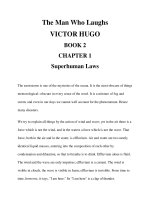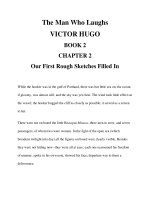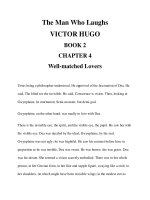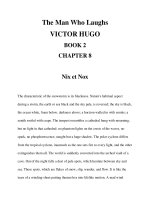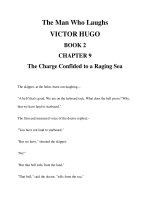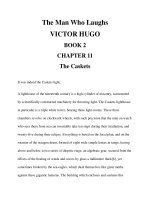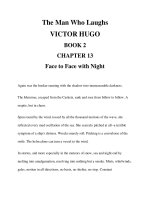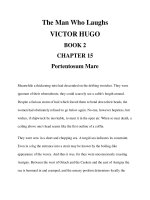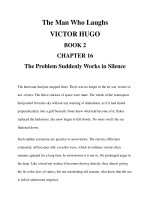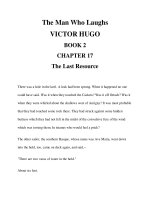THE MAN WHO LAUGHS VICTOR HUGO PART 2 BOOK 3 CHAPTER 2 pptx
Bạn đang xem bản rút gọn của tài liệu. Xem và tải ngay bản đầy đủ của tài liệu tại đây (22.98 KB, 8 trang )
THE MAN WHO LAUGHS
VICTOR HUGO
PART 2
BOOK 3
CHAPTER 2
Open-Air Eloquence
One very cold and windy evening, on which there was every reason why folks
should hasten on their way along the street, a man, who was walking in Tarrinzeau
Field close under the walls of the tavern, stopped suddenly. It was during the last
months of winter between 1704 and 1705. This man, whose dress indicated a
sailor, was of good mien and fine figure, things imperative to courtiers, and not
forbidden to common folk.
Why did he stop? To listen. What to? To a voice apparently speaking in the court
on the other side of the wall, a voice a little weakened by age, but so powerful
notwithstanding that it reached the passer-by in the street. At the same time might
be heard in the enclosure, from which the voice came, the hubbub of a crowd.
This voice said,
"Men and women of London, here I am! I cordially wish you joy of being English.
You are a great people. I say more: you are a great populace. Your fisticuffs are
even better than your sword thrusts. You have an appetite. You are the nation
which eats other nations a magnificent function! This suction of the world makes
England preeminent. As politicians and philosophers, in the management of
colonies, populations, and industry, and in the desire to do others any harm which
may turn to your own good, you stand alone. The hour will come when two boards
will be put up on earth inscribed on one side, Men; on the other, Englishmen. I
mention this to your glory, I, who am neither English nor human, having the
honour to be a bear. Still more I am a doctor. That follows. Gentlemen, I teach.
What? Two kinds of things things which I know, and things which I do not. I sell
my drugs and I sell my ideas. Approach and listen. Science invites you. Open your
ear; if it is small, it will hold but little truth; if large, a great deal of folly will find
its way in. Now, then, attention! I teach the Pseudoxia Epidemica. I have a
comrade who will make you laugh, but I can make you think. We live in the same
box, laughter being of quite as old a family as thought. When people asked
Democritus, 'How do you know?' he answered, 'I laugh.' And if I am asked, 'Why
do you laugh?' I shall answer, 'I know.' However, I am not laughing. I am the
rectifier of popular errors. I take upon myself the task of cleaning your intellects.
They require it. Heaven permits people to deceive themselves, and to be deceived.
It is useless to be absurdly modest. I frankly avow that I believe in Providence,
even where it is wrong. Only when I see filth errors are filth I sweep them away.
How am I sure of what I know? That concerns only myself. Every one catches
wisdom as he can. Lactantius asked questions of, and received answers from, a
bronze head of Virgil. Sylvester II. conversed with birds. Did the birds speak? Did
the Pope twitter? That is a question. The dead child of the Rabbi Elcazer talked to
Saint Augustine. Between ourselves, I doubt all these facts except the last. The
dead child might perhaps talk, because under its tongue it had a gold plate, on
which were engraved divers constellations. Thus he deceived people. The fact
explains itself. You see my moderation. I separate the true from the false. See! here
are other errors in which, no doubt, you partake, poor ignorant folks that you are,
and from which I wish to free you. Dioscorides believed that there was a god in the
henbane; Chrysippus in the cynopaste; Josephus in the root bauras; Homer in the
plant moly. They were all wrong. The spirits in herbs are not gods but devils. I
have tested this fact. It is not true that the serpent which tempted Eve had a human
face, as Cadmus relates. Garcias de Horto, Cadamosto, and John Hugo,
Archbishop of Treves, deny that it is sufficient to saw down a tree to catch an
elephant. I incline to their opinion. Citizens, the efforts of Lucifer are the cause of
all false impressions. Under the reign of such a prince it is natural that meteors of
error and of perdition should arise. My friends, Claudius Pulcher did not die
because the fowls refused to come out of the fowl house. The fact is, that Lucifer,
having foreseen the death of Claudius Pulcher, took care to prevent the birds
feeding. That Beelzebub gave the Emperor Vespasian the virtue of curing the lame
and giving sight to the blind, by his touch, was an act praiseworthy in itself, but of
which the motive was culpable. Gentlemen, distrust those false doctors, who sell
the root of the bryony and the white snake, and who make washes with honey and
the blood of a cock. See clearly through that which is false. It is not quite true that
Orion was the result of a natural function of Jupiter. The truth is that it was
Mercury who produced this star in that way. It is not true that Adam had a navel.
When St. George killed the dragon he had not the daughter of a saint standing by
his side. St. Jerome had not a clock on the chimney-piece of his study; first,
because living in a cave, he had no study; secondly, because he had no chimney-
piece; thirdly, because clocks were not yet invented. Let us put these things right.
Put them right. O gentlefolks, who listen to me, if any one tells you that a lizard
will be born in your head if you smell the herb valerian; that the rotting carcase of
the ox changes into bees, and that of the horse into hornets; that a man weighs
more when dead than when alive; that the blood of the he-goat dissolves emeralds;
that a caterpillar, a fly, and a spider, seen on the same tree, announces famine, war,
and pestilence; that the falling sickness is to be cured by a worm found in the head
of a buck do not believe him. These things are errors. But now listen to truths.
The skin of a sea-calf is a safeguard against thunder. The toad feeds upon earth,
which causes a stone to come into his head. The rose of Jericho blooms on
Christmas Eve. Serpents cannot endure the shadow of the ash tree. The elephant
has no joints, and sleeps resting upright against a tree. Make a toad sit upon a
cock's egg, and he will hatch a scorpion which will become a salamander. A blind
person will recover sight by putting one hand on the left side of the altar and the
other on his eyes. Virginity does not hinder maternity. Honest people, lay these
truths to heart. Above all, you can believe in Providence in either of two ways,
either as thirst believes in the orange, or as the ass believes in the whip. Now I am
going to introduce you to my family."
Here a violent gust of wind shook the window-frames and shutters of the inn,
which stood detached. It was like a prolonged murmur of the sky. The orator
paused a moment, and then resumed.
"An interruption; very good. Speak, north wind. Gentlemen, I am not angry. The
wind is loquacious, like all solitary creatures. There is no one to keep him
company up there, so he jabbers. I resume the thread of my discourse. Here you
see associated artists. We are four a lupo principium. I begin by my friend, who is
a wolf. He does not conceal it. See him! He is educated, grave, and sagacious.
Providence, perhaps, entertained for a moment the idea of making him a doctor of
the university; but for that one must be rather stupid, and that he is not. I may add
that he has no prejudices, and is not aristocratic. He chats sometimes with bitches;
he who, by right, should consort only with she-wolves. His heirs, if he have any,
will no doubt gracefully combine the yap of their mother with the howl of their
father. Because he does howl. He howls in sympathy with men. He barks as well,
in condescension to civilization a magnanimous concession. Homo is a dog made
perfect. Let us venerate the dog. The dog curious animal! sweats with its tongue
and smiles with its tail. Gentlemen, Homo equals in wisdom, and surpasses in
cordiality, the hairless wolf of Mexico, the wonderful xoloïtzeniski. I may add that
he is humble. He has the modesty of a wolf who is useful to men. He is helpful and
charitable, and says nothing about it. His left paw knows not the good which his
right paw does. These are his merits. Of the other, my second friend, I have but one
word to say. He is a monster. You will admire him. He was formerly abandoned by
pirates on the shores of the wild ocean. This third one is blind. Is she an exception?
No, we are all blind. The miser is blind; he sees gold, and he does not see riches.
The prodigal is blind; he sees the beginning, and does not see the end. The coquette
is blind; she does not see her wrinkles. The learned man is blind; he does not see
his own ignorance. The honest man is blind; he does not see the thief. The thief is
blind; he does not see God. God is blind; the day that he created the world He did
not see the devil manage to creep into it. I myself am blind; I speak, and do not see
that you are deaf. This blind girl who accompanies us is a mysterious priestess.
Vesta has confided to her her torch. She has in her character depths as soft as a
division in the wool of a sheep. I believe her to be a king's daughter, though I do
not assert it as a fact. A laudable distrust is the attribute of wisdom. For my own
part, I reason and I doctor, I think and I heal. Chirurgus sum. I cure fevers,
miasmas, and plagues. Almost all our melancholy and sufferings are issues, which
if carefully treated relieve us quietly from other evils which might be worse. All
the same I do not recommend you to have an anthrax, otherwise called carbuncle.
It is a stupid malady, and serves no good end. One dies of it that is all. I am
neither uncultivated nor rustic. I honour eloquence and poetry, and live in an
innocent union with these goddesses. I conclude by a piece of advice. Ladies and
gentlemen, on the sunny side of your dispositions, cultivate virtue, modesty,
honesty, probity, justice, and love. Each one here below may thus have his little
pot of flowers on his window-sill. My lords and gentlemen, I have spoken. The
play is about to begin."
The man who was apparently a sailor, and who had been listening outside, entered
the lower room of the inn, crossed it, paid the necessary entrance money, reached
the courtyard which was full of people, saw at the bottom of it a caravan on
wheels, wide open, and on the platform an old man dressed in a bearskin, a young
man looking like a mask, a blind girl, and a wolf.
"Gracious heaven!" he cried, "what delightful people!"
